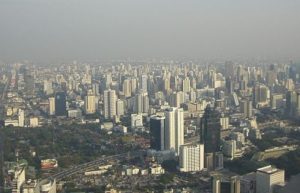 Thailand’s foreign direct investments (FDIs) in the first half of this year fell 90% to US$347 million from US$4.2 billion in the same period last year, the lowest in more than a decade, said the Bank of Thailand (BOT).
Thailand’s foreign direct investments (FDIs) in the first half of this year fell 90% to US$347 million from US$4.2 billion in the same period last year, the lowest in more than a decade, said the Bank of Thailand (BOT).
The central bank in a report said the FDI value was the lowest since 2005. It traced the decline to the structure of the Thai industry, which continues to produce low-technology products even as Thai wages have risen compared to those of its neighboring countries.
The global economic slowdown also played a part, as foreign investors had been hesitant about funding large-scale projects, said the central bank.
Thailand’s unstable politics in recent years also exerted a negative impact. On August 7, Thailand held a referendum on a new constitution amidst increasingly intense disagreements on the country’s course of development.
However, the government’s Board of Investment (BoI) rejected the BOT report, saying it was based on purely financial data. BoI said FDI projects registered in the first half of 2016 showed foreign investment capital had been on the rise.
According to the BoI, the Southeast Asian country attracted 328 FDI projects with a combined investment of $2.43 billion in the first six months of 2016.
Thai export value declines
Meanwhile, Thailand’s merchandise exports registered a 1.9% growth in value in June year-on-year as gold exports rose after global gold prices went up following the Brexit referendum, in which the British people voted for the United Kingdom to leave the EU.
Excluding gold, however, exports fell by 1.6%. The contraction for this month is smaller than year-ago levels as automobile and rubber product exports dropped less steeply than they did last year.
Exports of a wide range of goods in June 2016 still suffered from the slow economic recovery of trading partners, persistent structural problems, and contracting export prices of petroleum-related products. On the other hand, exports of air-conditioners and solar cell panels expanded, and those of integrated circuits and parts picked up after contracting in earlier periods, benefiting from accelerated demand from trading partners for imported raw materials for new smartphone models to be launched in September.
In the second quarter, the value of Thai exports excluding gold remained in contraction due to the slow pace of rebound of trading partners, continuing structural problems, and falling export prices despite some recent improvement in global crude oil prices. This resulted in low levels of manufacturing production and private investment, said the bank.
Photo: Kimmam





